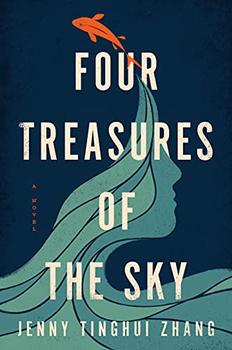Summary | Excerpt | Reading Guide | Reviews | Beyond the book | Read-Alikes | Genres & Themes | Author Bio

The High Divide opens in the small frontier town of Sloan's Crossing, Minnesota in 1886. The Pope family is composed of Ulysses, a jaded Civil War veteran with "the world in his bones," his wife Gretta, a Danish immigrant, and their sons Eli, 16, and Danny, 11. As the story begins, Ulysses has disappeared; rumor has it that he has left Gretta for another woman – a fact that appears to be supported by a letter Eli intercepts from a certain Laura Powers in Bismarck, Dakota. The Popes' odious landlord, Mead Fogarty, is pressing Gretta for their overdue rent. Yet neither she nor her sons are willing to accept that Ulysses is gone for good.
The novel is composed of three quests: Eli and Danny's to find their father, Gretta's to win her husband back, and Ulysses' to make amends for an atrocity he committed during the war under General Custer. Eli and Danny hop a train to Fargo to find Mrs. Powers and continue on to Montana Territory (see 'Beyond the Book'), where word has it their father is selling buffalo bones in Miles City. Meanwhile, Gretta heads east to St. Paul to see if her sister-in-law can shed any light on Ulysses' whereabouts. Along the way some disturbing secrets emerge about her husband, exacerbating "the dilemma Gretta had been facing for years: how to hold on to a man you were afraid of knowing." In alternating chapters, readers follow these three unfolding journeys.
Overall, this makes for something of a thin plot – none of the strands are epic enough to make this the lasting, Great American novel it might be seeking to emulate – but the book is strong on atmosphere and themes. It works very well as a snapshot of a particular time and place. Sacrifice, family loyalty, remorse, and being or treating a stranger are all topics under consideration. Enger also captures a dying way of life: the buffalo have been hunted to near-extinction, and Native Americans are being driven from the plains onto reservations.
The novel successfully exploits the rift between history and legend. For instance, Eli gets caught up in a buffalo hunt that took place in real life. Enger introduces some historical figures into the scene, including William T. Hornaday, a Smithsonian curator (and later the first director of the Bronx Zoo) who wants to take bison specimens for his museum before it is too late. He is more concerned with ensuring his reputation than with the survival of a species. In such ways Enger exposes the shadow side of legends. General Custer does not seem such a heroic figure once details of the Washita Indian massacre come to light, and Ulysses' name reminds readers that myths (as in Homer's Odyssey) do not always end rosily.
Enger alludes to Christian scripture as well as to Greek mythology. The first line ponders whether an interventionist God might be looking down and arranging events: "That summer was cool and windless, the clouds unrelenting, as if God had reached out his hand one day and nudged the sun from its rightful place." Guilt and the possibility of redemption form a major preoccupation here. A Cheyenne brave scoffs at the idea of atonement letting people off the hook; "You think because your god suffered, you don't have to suffer." Instead, the novel proposes human action as the only way of rectifying situations: you must "sink down into the dark muck of your hearts and look hard at what you find there – and then go and make things rights," as a preacher tells Eli and Danny. Indeed, this is Ulysses' aim. A late scene of him bathing in the river might also function as a symbolic baptism ceremony.
With its poetic descriptive language (phrases such as "dull-green clutches of sage," "snoring in the lee of a stunted juniper," and "the rimy grass in a willow-rimed swale") and authentic yet slightly archaic vocabulary (chifforobe, spraddle-legged), The High Divide fits clearly into the tradition of the modern literary Western, a lineage that includes John Williams' Butcher's Crossing, Charles Portis' True Grit, Cormac McCarthy's works, and, more recently, Philipp Meyer's The Son. Perhaps it is most memorable, however, as a story of enduring family ties and the possibility of new beginnings, in spite of trauma.
![]() This review was originally published in The BookBrowse Review in October 2014, and has been updated for the
June 2015 edition.
Click here to go to this issue.
This review was originally published in The BookBrowse Review in October 2014, and has been updated for the
June 2015 edition.
Click here to go to this issue.

If you liked The High Divide, try these:

by Jenny Tinghui Zhang
Published 2022
A propulsive and dazzling debut novel set against the backdrop of the Chinese Exclusion Act, about a Chinese girl fighting to claim her place in the 1880s American West.

by Jess Walter
Published 2021
The author of the #1 New York Times bestseller Beautiful Ruins delivers another "literary miracle" (NPR) - a propulsive, richly entertaining novel about two adventure-seeking brothers, the enemies who threaten them, and the women who reveal to them an unjust world on the brink of upheaval.
Your guide toexceptional books
BookBrowse seeks out and recommends the best in contemporary fiction and nonfiction—books that not only engage and entertain but also deepen our understanding of ourselves and the world around us.